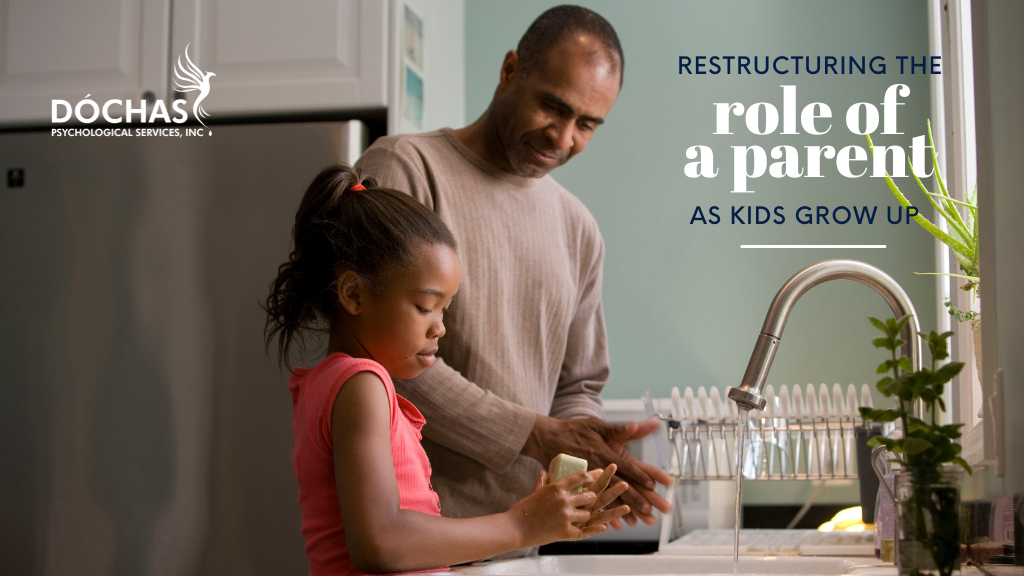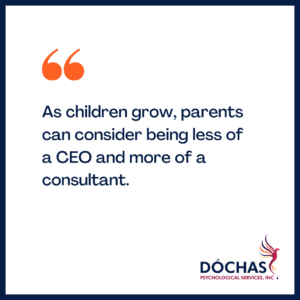It’s Pooja on the Dóchas blog, and today I’m going to talk about restructuring the role of a parent as kids grow up.
It is surprising how quickly time flies when children grow up. The ever-changing landscape from diapers to graduation also comes with changes to the parent role. And before you know it, your relationship with your child is changing as they grow older, and you find yourself relating to them in a different way! Let’s face it, most of us are winging it, and we’re trying to keep up with the overnight changes to school, social media, technology and trends that our kids are a part of. How do you navigate this while adapting your role as your kids grow up? Here are a few ideas to consider when restructuring the role of a parent.
Ideas to consider:
1. Coming to terms that your child might be different than the expectations you had previously
This can be challenging and surprising. The ideas, hopes and expectations you might have had for your child may have morphed and changed along the way. Your child might have a different set of interests, a different temperament, or an identity that might be different than what you expected. Their preferences for specific things. social groups etc. can also change as they grow. As ebbs and flows happen within these areas it is still important to respect their growth even if it might seem trivial or different from what you might have expected.
2. Changing style from CEO to consultant
Taking on the leadership role in the early parenting times makes since, since your child is dependent on you for many things in order to flourish. As they grow, parents can consider being less of the CEO and more of the consultant. This is important to help teach your kids in a non-confrontational way about the nature of being human. It can be difficult to impart wisdom without being critical. But criticism often shuts us down, while offering expert advice and knowledge in a compassionate way can empower them to develop life skills.
3. Setting boundaries and saying no
Boundaries are important! Here are a few examples. As your child is developing into an adult, parents should refrain from sharing intimate and personal details about their relationships, even if the child may start to look mature enough to handle it. This is because this can be confusing and has the potential to create conflict in the family. Another example is, even as they are maturing and maybe encountering difficulty, it’s still okay to say no to prevent enabling behaviours that might not be beneficial for them. This depends on what your family values are and what you would like to teach your child in the long term. But you can still set boundaries.
4. Do things that you love together
Whether that is family traditions, their interests, or yours—make time for this. As children mature, their interests might be more peer, social group or activity centred. Kids might seem indifferent in doing certain things with the family. This can be challenging to integrate with, however, it is important to make time to continue being connected to your child as they grow up, as well as continuing to connect as a family.

So these were a few ideas about restructuring the role of a parent as your child grows up! This time can be confusing for both parents and children, so it’s normal to feel a bit uncertain. There are also family situations that can sometimes be more challenging, which is why it can be helpful to have a professional helping hand in these situations! You can reach out to us here at Dóchas for advice at 780 446 0300 or drop us a line at info@dochaspsych.com.
About Dóchas Psychological
Dóchas Psychological Services is a well-established and trusted therapy clinic located in Spruce Grove, Alberta. At Dóchas we value the idea that everyone deserves a safe space. Through connection and education, our team works hard to build a trustworthy relationship with each of our clients. It is our goal to create a community for our clients to feel like they belong.
Disclaimer
Information provided through Dóchas Psychological Services blogs or vlogs is meant for educational purposes only. They are NOT medical or mental health advice. You can read more about our disclaimer here.










